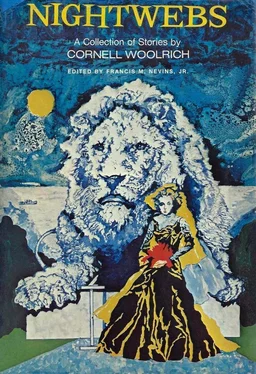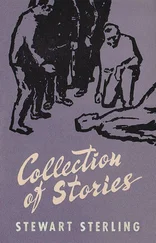What was there I could say? “No. I simply went in, to — to rest awhile, and think.”
“There was rather a severe wind — and rainstorm up here a week ago,” he let me know. “It may have uprooted the sign we had standing at the entrance to this roadway. Thoroughfare is prohibited, it runs through private grounds.”
“I saw no sign,” I told him truthfully.
“But if you went in just to rest and think, how is it you were so agitated when you left just now? I saw you when you came out. What had you done in there to frighten you so?” And then, very slowly, spacing each word, “What — had — you — seen?”
But I’d had about enough. “Are you in charge of these grounds? Well, whether you are or not, I resent being questioned like this! You’ve damaged my car, with deliberation. I’ve a good mind to—”
“Step out and come with me,” he said, and here was suddenly the thin, ugly muzzle of a Luger resting across the doorstep, trained at me. His face remained cold, expressionless.
I pulled the catch out, stepped down beside him. “This is kidnaping,” I said grimly.
“No,” he said, “you’d have a hard time proving that. You’re guilty of trespassing. We have a perfect right to detain you — until you’ve explained clearly, to our satisfaction, what you saw in there to frighten you so.”
Or in other words, I said to myself, just how much I’ve found out — about something I’m not supposed to know. Something kept warning me: No matter what turns up, don’t admit you noticed those vents above the graves in there. Don ‘t let on you saw them! I didn’t know why I shouldn’t, but it kept pounding at me relentlessly.
“Walk up the road ahead of me,” he directed. “If you try to bolt off into the darkness, I’ll shoot you without compunction.”
I turned and walked slowly back along the middle of the road, hands helplessly at my sides. The scrape and grate of his footsteps followed behind me. He knew enough not to close in and give me a chance to wrest the gun from him. I may have been afraid of burial alive, but I wasn’t particularly afraid of bullets.
We came abreast of the cemetery-gate just as the watchman was letting himself out.
He threw up his head in surprise, picked up his lantern and came over.
“This man was in there just now. Walk along parallel to him, but not too close, and keep your lantern on him.”
“Yes, Brother.” At the time I thought it was just slangy informality on the caretaker’s part; the respectful way he said it should have told me different. As he took up his position off to one side of me I heard him hiss vengefully, “Dirty snooper!”
We were now following a narrow brick footpath, which I had missed seeing altogether from the car that afternoon, indian file, myself in the middle. It brought us, in about five minutes, to a substantial-looking country house, entirely surrounded by such a thick growth of trees that it must have been completely invisible from both roads even in the broad daylight. The lower story was of stone, the upper of stucco. It was obviously not abandoned or in disrepair, but gave no sign of life. All the windows, upper as well as lower, had been boarded up.
The three of us stepped up on the empty porch, whose floorboards glistened with new varnish. The man with the lantern thrust a key into the seemingly boarded-up door, turned it, and swung the entire dummy-facing back intact. Behind it stood the real door, thick oak with an insert of bevelled glass, veiled on the inside by a curtain through which an electric light glimmered dully.
He unlocked that, too, and we were in a warm, well-furnished hall. The watchman took up his lantern and went toward the back of this, with a murmured “I’ll be right in.,’ My original captor turned me aside into a room furnished like a study, came in after me, at last pocketed the Luger that had persuaded me so well.
A man was sitting behind a large desk, with a reading lamp trained on it, going over some papers. He looked up, paled momentarily, then recovered himself. I’d seen that however; it showed that all the fear was not on my side of the fence. The same silent, warning voice kept pegging away at me: Don’t admit you saw those vents, watch your step!
The man who had brought me in said, “I found his car parked beside the cemetery-rail — where lightning struck and loosened that upright the other night. I waited, until he came out. I thought you’d like to talk to him, Brother.” Again that “Brother.”
“You were right, Brother,” the man behind the desk nodded. He said to me, “What were you doing in there?”
The door behind me opened and the man who had played the part of caretaker came in. He had on a business-suit now just like the other two, in place of the dungarees and greasy sweater. I took a good look at his hands; they were not calloused, but had been recently blistered. I could see the circular threads of skin remaining where the blisters had opened. He was an amateur — and not a professional — gravedigger.
“Did he tamper with anything?” the man behind the desk asked him in that cool, detached voice.
“He certainly did. Jerome’s was disturbed. The sod — around it — had been scraped away, just enough to lay it bare.” He accented that pronoun, to give it special meaning.
My original captor went through my pockets deftly and swiftly, brought to light the penknife, snapped it open, showed them the grass-stains on the steel blade.
The beat of Death’s dark wings was close in the air above my head.
“I’m sorry. Take him out in back of the house with you,” the one behind the desk said flatly. As though those words were my death-warrant.
The whole thing was too incredible, too fantastic, I couldn’t quite force myself to believe I was in danger of being put to death then and there like a mad dog. But I saw the one next to me slowly reach toward the pocket where the Luger bulged.
“I’ll have to go out there and dig again, after I got all cleaned up,” the one who had played the part of watchman sighed regretfully, and glanced ruefully at his blistered hands.
I looked from one to the other, still not fully aware of what it all portended. Then on an impulse — an impulse that saved my life — I blurted out: “You see, it wasn’t just idle curiosity on my part. All my life, since I was ten, I’ve dreaded the thought of burial alive—”
Before I knew it I had told them the whole story, about my father and the lasting impression it had made.
After I had finished, the man at the desk said, slowly, “What year was this — and where?”
“In New Orleans,” I said, “in 1922.”
His eyes flicked to the man on my left. “Get New Orleans on long distance,” he said quietly. “Find out if an undertaker was brought to trial for burying a paralyzed war-veteran named Donald Ingram alive in All-Saints Cemetery in September 1922.”
“The 14th,” I said, shutting my eyes briefly.
“You are a lawyer,” he instructed, “doing it at the behest of the man’s son, because of some litigation that is pending, if they ask you.” The door closed after him; I stayed there with the other two.
The envoy came back, silently handed a written sheet of paper to the one at the desk. He read it through. “Your mother?” he said.
“She died insane in 1929. I had her cremated, to avoid—”
He crumpled the sheet of paper, threw it from him. “Would you care to join us?” he said, his eyes sparkling shrewdly.
“Who — are you?” I hedged.
He didn’t answer that. “We can cure you, heal you. We can do more for you than any doctor, any mental specialist in the world. Would you not like to have this dread, this curse, lifted from you, never to return?”
Читать дальше












